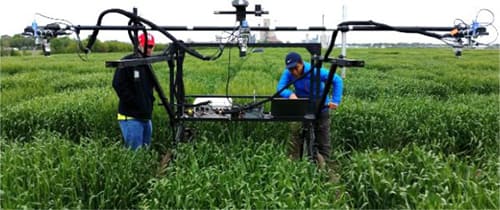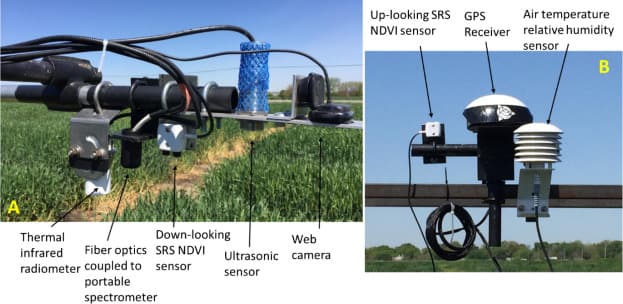High Throughput Field Phenotyping Multi-sensor System - Case Study

Field phenotyping system platform featuring Apogee Instruments' infrared radiometer.
The system consisted of a manually operated platform using a laptop with a special developed LabVIEW program as a controlling unit to collect, synchronize, and store measurements from all sensors for analysis. Apogee's SI-131 was mounted to a sensor bar on the platform at a distance that allowed for a representative subarea of the crop canopy to be seen in the sensor's field of view. The analog infrared radiometer was connected to the laptop through a USB data acquisition board. The LabVIEW program read the infrared radiometer outputs from the analog input ports and applied Apogee's calibration equation to convert the sensor voltage to degrees Celsius. Yufeng Ge, a Biological Systems Engineer from the study said, "The infrared radiometer by Apogee Instruments is among one of the most reliable and trustworthy sensors I have used."

Sensors that were mounted to the sensor bar of the platform.
The system was successfully tested over 240 plots of wheat and 120 plots of soybean crop using a manual stop-measure-go data collection method.* The study determined that final grain yield of soybean is strongly correlated with all six sensor base traits, and suggested the usefulness of the sensor system in plant breeding.
*A stop-measure-go data collection method was used because slow response times from sensors did not allow for continuous measurement (the SI-131 with a response time of 0.6 seconds was noted as one of these sensors in the reference article). Since this study took place Apogee has developed high speed, analog infrared radiometers with a response time of 0.2 seconds and SDI-12 infrared radiometers...more information >
"The Infrared Radiometer by Apogee is among one of the most reliable and trustworthy sensors I have used."
-Yufeng Ge
Biological Systems Engineer
University of Nebraska-Lincoln
